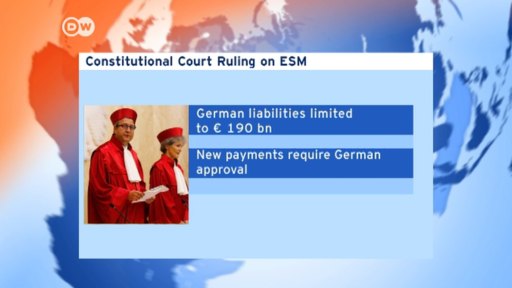Relief for the euro

The Constitutional Court in Karlsruhe rejected objections to the legality of Germany's contribution to the long-anticipated European Stability Mechanism (ESM) and separate budget pact in a landmark ruling on Wednesday. The ruling paves the way for German President Joachim Gauck to sign the legislation into law in a move tipped as a possible turning point in the eurozone debt crisis.
"The Second Senate of the Federal Constitutional Court has rejected the injunctions with the stipulation that a ratification of the ESM Treaty is only admissible if [certain conditions] can be guaranteed under international law," Chief Justice Andreas Vosskukle said.
The ESM will provide the eurozone with the flexibility to deploy 500 billion euros ($630 billion) in emergency funds to support its weakest members. As the strongest economy in Europe, Germany will be the main contributor.
But the court specified that any financial burdens for Germany arising from the ESM must be limited to its 190-billion-euro share, currently set out in the treaty. The Bundestag (Germany's lower house of parliament) must be called upon to sanction any burdens that exceed this figure.
It also ruled that the Bundestag and Bundesrat (the upper house) must remain informed on ESM activities, despite a clause in the treaty that seeks to keep decisions of the fund confidential.
Merkel, markets hail ruling
German Chancellor Angela Merkel welcomed the court's decision in a speech to parliament on Wednesday, describing it as a "good day for Germany and a good day for Europe."
"Germany is once again sending a strong message to Europe and beyond," she said. "Germany is decisively living up to its responsibilities as Europe's biggest economy and a reliable partner."
But the court's verdict will not be universally welcomed. Despite receiving overwhelming parliamentary approval for the measures back in June, Germany was forced to delay the formal ratification of the law after some 37,000 objections were filed.
Key among the opponents is Peter Gauweiler, a euroskeptic backbench lawmaker in Merkel's conservative bloc. He had argued that the ESM violated Germany's constitution, warning it would result in Berlin no longer having complete control over budgetary decisions. A last-minute legal challenge from Gauweiler was rejected by the Karlsruhe court on Tuesday.
Germany was the only country within the 17-nation eurozone bloc yet to ratify the ESM and fiscal pact, which had been due to come into force in July. It will replace the temporary European Financial Stability Facility.
ccp/sej (AFP, dpa, Reuters)
